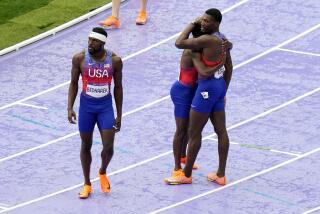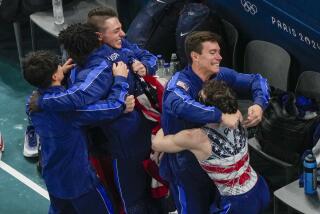Reynolds Loses His Case in 400 : Olympic trials: World record-holder finishes fifth and fails to qualify for team. Everett is second-fastest of all time at 43.81.
- Share via
NEW ORLEANS — After 21 months of legal battles and a week of defiant posturing, suspended runner Butch Reynolds finally cooperated with track officials here Friday.
By finishing fifth in the 400-meter finals at the U.S. Olympic trials, Reynolds provided instant relief to the U.S. Olympic Committee, whose members had been dreading the prospect of his finishing in the top three and automatically earning a place on the Olympic team.
With his placing, Reynolds fashioned his own compromise in what has been an anguishing situation. Technically, the world record-holder is on the U.S. Olympic team, available for duty on the 1,600-meter relay team. Practically, however, U.S. officials need never call on him again. Reynolds’ destiny is to become a 1992 Olympian in name only.
Two 1988 Olympians and a newly minted one shot past Reynolds in the stretch Friday:Danny Everett in a time of 43.81 seconds, Steve Lewis in 44.08 and Quincy Watts in 44.22. Reynolds ran 44.65.
Everett’s time was the second-fastest in history--only Reynolds’ world record of 43.29 is better--and his pace pulled the entire field to fast times on an evening of 85-degree heat and 65% humidity.
As has a high percentage of the U.S. Olympic track team, the top three finishers either grew up in Los Angeles or currently train there. Everett and Lewis went to UCLA, and Watts is a senior at USC. Everett and Lewis were coached by John Smith when they were at UCLA, and Smith is Watts’ current coach.
Everett’s victory becomes even more impressive when taken in context: four of the six fastest quarter milers in history were at the line.
After a false start, the much-anticipated race began with Reynolds getting out recklessly fast. He went through 200 meters in 21 seconds and only Everett was close.
Watts made a move coming into the turn, then Everett and Lewis surged coming out of it. The field came into the homestretch, bucking a noticeable head wind. Reynolds, normally a runner with impeccable technique, flailed his arms and began to fade. Andrew Valmon seized the chance and passed him for fourth.
Reynolds, who had been composed amid the chaos of the early rounds, seemed stunned after the race. He left the track immediately, rather than watch Everett, Lewis and Watts jog around, waving the tiny American flags given to Olympians.
In a holding area under the stands, Reynolds slumped into a metal folding chair, a wet towel draped across his shoulders.
“I’m tired,” he said quietly. “I’m really, really tired.”
Reynolds attributed his fatigue to the emotional toll of his long fight to clear his name after a drug suspension in August of 1990. Reynolds ran here only after the U.S. Supreme Court ordered officials not to bar him.
He said the stress might have caught up with him in the last 50 meters.
“It bleeds you,” Reynolds said. “I’m glad that the trials are over and I can take a moment to cry, or do what I want to do. I took fifth place, but it’s still a victory for me. I’m going to Barcelona, and if they let me run, I will.”
It is not likely that Reynolds will get a chance. The top three trials finishers automatically make the Olympic team to run in the open 400. The next three runners officially make the team and will be considered for the relay. Because of Reynolds’ uncertain international eligibility, Chip Jenkins, who finished seventh, was also named to the team.
“Butch is on the Olympic team, until the USOC tells me otherwise,” said Mel Rosen, the men’s Olympic coach.
Had Reynolds placed higher, the next move from officials of The Athletics Congress, the national governing body for track and field, and the USOC would have been more difficult.
TAC says it is bound by the Supreme Court order to submit Reynolds’ name to the USOC on its Olympic declaration sheet. The USOC must then pass that list on to the International Olympic Committee. The IOC will submit the names to the International Amateur Athletic Federation, the international governing body that suspended Reynolds and still considers him ineligible.
It is up to the IAAF to determine Reynolds’ eligibility to compete at Barcelona. Not only has the IAAF steadfastly maintained it will not allow him to compete in the Olympics, it has also repeatedly warned that he will face further sanctions because of his participation here.
The Olympic team will be declared by July 10, and the relay team members will be declared by Aug. 6.
TAC officials will meet today to discuss their options.
Harvey Schiller, executive director of the USOC, said Reynolds’ case will be brought up at a regularly scheduled meeting of the USOC’s executive committee, Sunday at Indianapolis.
“It wasn’t on the agenda, but it will undoubtedly be discussed,” he said. “My expectation is that we will probably forward the name (to the IOC).”
Reynolds’ attorney said Friday that the case would continue. Among the options he discussed were obtaining a judgment against the IAAF and seizing any assets the London-based organization might have in the United States, serving legal papers on any IAAF official who might travel to this country, and going to the English courts to sue the IAAF.
These have been confusing and trying times for the runners, whose first race was postponed four times. Even in his defeat, Reynolds wrested the spotlight from the other Olympians who had to wait until he and his “team”--it swelled Friday to include his attorney and his attorney’s public relations man--answered questions from reporters.
Everett, the bronze medalist from 1988, beamed when his turn to talk came. Lewis, the Olympic gold medalist, smiled and said that he, too, was delighted to make the team. Three hours later, both runners advanced to the second round in the 200 meters.
Next up was Watts, 22, the NCAA 400-meter champion. He thanked his college coach, Jim Bush. He thanked his father, Rufus, who along with six other family members had traveled here from Inglewood to watch the man many consider to be the world’s next great quarter miler.
John Smith, himself once the world’s best, smiled and said that Watts lacked only experience. How would the teacher grade his pupil in this most stressful of weeks, Smith was asked?
“I’d give him an A, and me an ulcer,” Smith said, perhaps voicing the sentiments of many.
More to Read
Go beyond the scoreboard
Get the latest on L.A.'s teams in the daily Sports Report newsletter.
You may occasionally receive promotional content from the Los Angeles Times.







